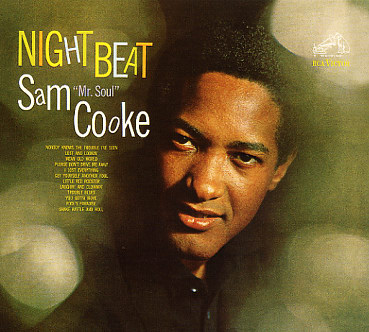The Friday Flashback: Sam Cooke's Night Beat
By Chuck Sudo in Arts & Entertainment on Mar 14, 2008 1:00PM
 As a teenager we must've worn out about four copies of the Sam Cooke compilation The Man and His Music. A 28 track collection ranging from his days with the Soul Stirrers to the triumph of "A Change is Gonna Come," it stood as the definitive retrospective of Cooke's career until BMG released Portrait of A Legend: 1951-1964 a few years back. Back then we were left wondering how Cooke suddenly went from the perfect saccharine sentiments of "Cupid" and "You Send Me" to the majesty of "Change." Even now, on our cd version of The Man and His Music the shift is abrupt.
As a teenager we must've worn out about four copies of the Sam Cooke compilation The Man and His Music. A 28 track collection ranging from his days with the Soul Stirrers to the triumph of "A Change is Gonna Come," it stood as the definitive retrospective of Cooke's career until BMG released Portrait of A Legend: 1951-1964 a few years back. Back then we were left wondering how Cooke suddenly went from the perfect saccharine sentiments of "Cupid" and "You Send Me" to the majesty of "Change." Even now, on our cd version of The Man and His Music the shift is abrupt.
Night Beat was the bridge.
Released in 1963, Night Beat was the first album conceived by Cooke as more than just a series of singles. The nearest comparable musical template would have to be the Frank Sinatra/Nelson Riddle concept records, but that would be a disservice to both Sinatra and Cooke.
Night Beat strips away the pop sheen so indicative of Cooke's singles and replaces it with a moody, stripped-down musical arrangement that showcases the best instrument in the studio: Cooke's raspy tenor. The song selections and sequence of Night Beat also hint slightly as Cooke's answer to critics that he couldn't sing blues with soul or conviction, conveniently forgetting his Bronzeville roots on the Gospel circuit when he could make women throw undergarments at him by singing Bible verse. After whetting the listener's appetite with a bouncy version of "Nobody Knows the Trouble I've Seen," Cooke gets down to business with the lonely "Lost and Lookin'" backed only by the lightly plucked bass of Clifford Hills. From that point, Cooke and his band are off and running, but at a pace akin to nursing your drink at Green Mill at last call. Cooke sets a smoldering fire to his version of Charles Brown's "Trouble Blues," while a deceptively sinister take on the Willie Dixon classic "Little Red Rooster" features call and response between Cooke, pianist Raymond Johnson and a sixteen-year-old organist named Billy Preston. That four a.m. mood permeates the record so deeply we think that every bar in the city that holds a four a.m. license should be required to play Night Beat at three.
The artistic success of Night Beat and Cooke's growing social awareness (he was one of the first black musicians to pay equal attention to both the artistic and business sides of his career) led to the swan song of "Change." Cooke was a savvy businessman and Night Beat hinted at the future direction of his music before he died under mysterious circumstances a year later at the age of 33. Instead of being the foundation for a new phase in Sam Cooke's career, Night Beat becomes a richer gem because it's one of a kind, only hinting at the promise of what might have been.
Listen: Sam Cooke - "Lost and Lookin'"
Listen: Sam Cooke - "Little Red Rooster"